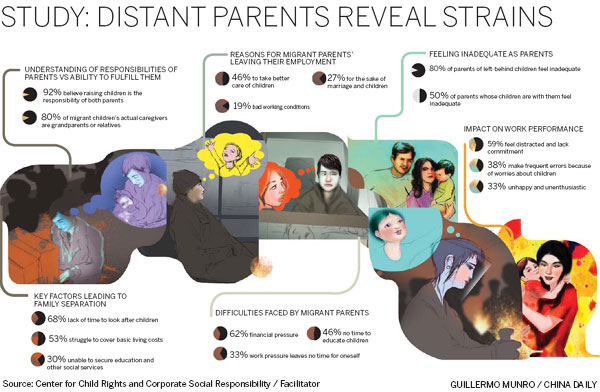Migrants feel pain of separation

| Left-behind children in Anhui province play after being donated new caps and gloves. Provided to China Daily |
Leaving home to find work takes heavy toll on families, study finds
Long-term separation from family members has become a top reason for migrant workers to consider quitting their jobs, a survey shows. This poses many problems for companies in maintaining an efficient and stable workforce, it says.
The report on the survey, published on Jan 9, also blames businesses for a lack of awareness about the problem and for insufficient support for their workers.
More than 40 percent of the migrant workers surveyed said they had left their jobs at least once for family reasons.
The main reasons include taking care of their children, attending to elderly family members and to be with their spouses.
The survey was conducted by the Center for Child Rights and Corporate Social Responsibility, a Beijing-based social enterprise, in cooperation with Facilitator, an NGO serving migrant workers.
About 1,500 workers and management staff members at nine factories in the Pearl River Delta and Chongqing municipality were interviewed last year. The Swedish embassy in China sponsored the study.
More than 80 percent of migrant workers who left their children behind in the countryside said they felt they had failed to play their role as parents.
About 70 percent of respondents said they had a strong sense of guilt and anxiety as a result of family separations and found it difficult to communicate with their children after long separations.
Hu Xuexiu, 38, a migrant worker from Hunan province, said she felt lonely every day, missing the daughter she left behind in her hometown. Hu works at an electronics factory in Zhuhai, Guangdong province.
She said she had considered quitting her job to be with her daughter, who is in high school.

China has more than 61 million children left behind by their migrant worker parents, or one in five children under the age of 18 living separately from their parents, the All-China Women's Federation says.
The situation has taken its toll not only on parent-children relationships, but on migrant workers' performance in factories.
More than half of the respondents said they felt distracted or not committed to their work. One in three said they made mistakes in their work as a result of worrying about their children's well-being.
The research also found that migrant workers chose to leave their children behind because of a shortage of income, difficulties in finding suitable schools, and busy work schedules that leave them with no time to be with their children.
The hukou household registration system means many children of migrant workers do not enjoy equal rights to education, healthcare and other social services in cities.
Many migrant workers said they would consider returning home to be reunited with their families if they could find jobs there.
The findings may help businesses to better fulfill their corporate social responsibilities, as a labor shortage has emerged in many places, the report said.
Hu suggested that companies do more to help migrant workers solve their family problems, such as setting flexible working hours for migrant workers with children, or providing activity centers where children can do homework or take part in after-school activities.
Li Tao, director of the social work development center of Facilitator's Beijing branch, says: "Most of the businesses interviewed showed little concern about the challenges that migrant parents face, including economic pressures and family communication breakdowns.
"But they agreed that such problems would certainly affect their business."
Li says most of the businesses do not have support strategies in their corporate social responsibility for migrant workers with children.
Liu Kun, spokesman for electronics giant Foxconn Technology Group, says the problem of migrant workers integrating with the cities they work in needs solving urgently, but it is impossible for it to be solved entirely by companies.
Without efforts from the governments in host cities to remove barriers, including hukou and inequality in access to public services, companies' efforts could make little difference, Liu says.
Zhang Yi, deputy director of the Institute of Sociology under the Chinese Academy of Social Sciences, says businesses could play a positive role in creating a family-friendly environment for migrant worker employees, such as by providing dormitories for couples and running kindergartens.
Contact the writers at fanfeifei@chinadaily.com.cn and hedan@chinadaily.com.cn

(China Daily Africa Weekly 01/17/2014 page24)
Today's Top News
- Dutch govt urged to mend chip dispute
- Macao's heritage sites hold special appeal for games
- China tackles N2O emissions, leading change
- AI should build a future where technology serves people
- Japan bears blame for worsening China ties
- People-centered outlook applauded































